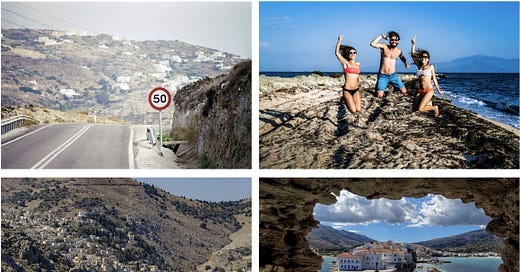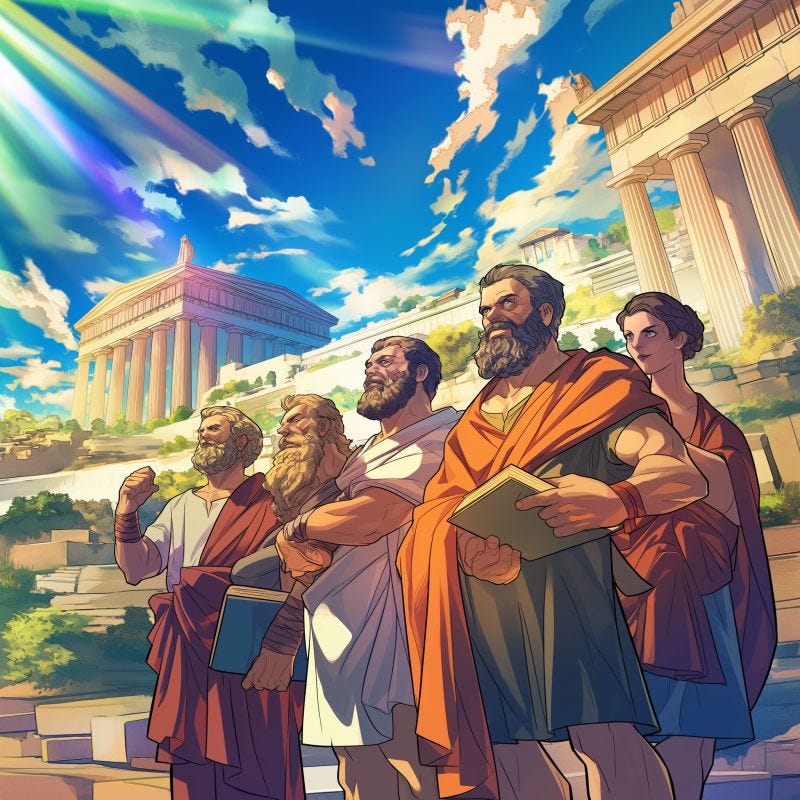Welcome to the 6 awesome new readers who joined in the past week!
If you haven’t subscribed, join 2,402 smart, curious people interested in Changing Greece.
🏖️ The fleeting Greek summer
The Greek summer will always be here. But it will never be the same again.
This is as true now as it was 50 years ago.
What’s different today?
The wheels of time are moving the same, but their weight is disproportionally larger.
This year, I was lucky enough to visit a few different Greek destinations, both in the mainland and in the islands. Some quite popular, others a bit more secluded.
I feel “lucky” because this is becoming a luxury many Greeks can no longer afford.
I also feel “lucky” because many of these places are seeing both their beautiful landscape and cultural uniqueness diminish drastically — some even irreversibly. It almost felt like I was witnessing the end of an era.
This makes me sad about what we are losing, but also worried about what is coming.
I have a few thoughts I’d like to share.
A classic “tragedy of the commons” problem
Very few parts in Greece are spared by our mass tourism model today.
We have fully commercialized the concept of “summer in Greece” and yet there is no plan about how to roll it out in a systematic, sustainable and value-additive way.
Yes, the Greek summer is a state of mind. But it soon risks being just that. A memory.
No matter what each new Tourism Minister says, what the Hellenic Chamber of Hotels claims, what short-term rental owners argue, what our beautifully crafted slogans read, there are no rules in this game expect for one: maximizing $$$ upfront.
Our tourism-dependent economy grows hungrier and more greedy every year. It is easy and lucrative today: the true costs are passed down to the next generation.

We are witnessing an unmistakable case of the tragedy of the commons:
“If many people enjoy unfettered access to a finite, valuable resource such as a pasture, they will tend to overuse it and may end up destroying its value altogether.”
With no guidelines about the present and no roadmap about the future, the tourism industry is depleting our common resource with few (if any) safeguards about its sustainable growth and longevity.
What can be done? Professor Stathis Kalyvas suggests two steps as a solution:
Accept that the damage is done and will likely grow, shift away from the logic that Greece’s coastline can be infinitely developed, stop ‘marketing’ Greece.
Take more (and more serious) protective measures.
I think Prof. Kalyvas is right. We first need to accept the reality of the situation. This means going through a full grieving cycle, on a personal and national level.

Many of us still romanticize the Greek summer of our childhood or adolescent years. This version is no longer possible. It is gone. Poof. No more.
But that does not mean we have no way to defend what’s left of it.
We need to get intentional and organized. We need a plan.
Here are a few ideas of what we can do:
Shift the mission of Greece’s Ministry of Tourism from promoting its continuous development to enforcing its sustainable longevity.
Create a strict policy framework for cruise ships, large yachts, helicopters, tourist buses and transfer vans, especially in the islands. With the exception of cruise ships, there are no enforceable rules (and even these are often circumvented).
Simplify real estate legislation to adhere to clear standards and avoid having 1000s different sub-clauses that act as loopholes for new building activity.
Building activity should be directly tied to local infrastructure capacity (i.e. water and sewage systems, landfills, electricity grid). New building licenses should only be granted if an area can support the new additions. Many islands (Sifnos, Paros, Antiparos, Mykonos, Spetses, Amorgos, Koufonisi) and even the mainland (the Peloponnese, Halkidiki and even Sounio) are suffering because of this.
Expand the use of monitoring tools to catch free riders (i.e. illegally closed entrances to the sea, beach bars laying 10x their allocated number of sun bets, hotels using fleets of unlicensed transfer vans that also double-charge customers).
Social cohesion should not be underestimated
The anti-tourism protests around Europe this summer are not a coincidence.
Social cohesion matters. And uncontrolled, mass tourism can seriously damage it.
Let’s look at the case of Barcelona, which should serve as a cautionary tale for Greece.
Barcelona has been for decades one of the most popular tourism destinations in the world, with tens of millions of visitors every year.
It is now a city where residents protest by using water pistols against tourists, the city hall is planning to eliminate short-term rentals in a few years, the mayor is raising the tourist tax for cruise ships, and its new marketing campaign is changing from its 15-year “Visit Barcelona” slogan to the more local version “This is Barcelona”.

Our very own Athens has also seen anti-tourism protests flare up in recent months.
Why do these tensions matter?
Not everyone makes economic gains from mass tourism, but…
Everyone has to deal with the consequences (noise, congestion, pollution)
Many locals are priced out of their homes and neighborhoods
Erosion of the local cultural elements that made these places unique and exciting to visit in the first place are degrading the entire tourist experience itself
There are those who believe tourism can be a net positive for everyone. I agree with that camp. But I am also the first to admit that it’s easier said than done.
“Visitors are a boon, if managed wisely,” writes The Economist in a piece that hits against anti-tourism protestors. Again, I agree. But that if is a massive hypothetical.
This requires having a comprehensive plan on both local and national levels.
Having a thriving tourism industry is a blessing, but it can easily turn into a curse. Its success should not only be measured in pure economic terms (e.g., % contributed to GDP, occupancy rates), but also judged based on social and environmental ones.
Escaping the vicious cycle, entering a virtuous one
We have to act now.
Unless we change something drastically today, Greece will not be able to sustain its current mass-tourism model much longer. We risk losing both our beautiful landscapes and this income stream (important for so many) in the near future.
But there is another reason why we should shift gears immediately.
Having an economy that fully depends on tourism makes us weak.
This is not just a Greece problem. It is an Europe-wide problem. As I’ve said before:
Europe needs to decide whether it wants to remain the rest of the world’s favorite tourist museum — and therefore lose its geopolitical power and relevance — or choose a more productive path for its citizens’ future.
But Greece is in an even more precarious position. We have very few large businesses, a small level of industry and importing much more than we export.

At the end of the day, this is an existential question: do Greeks really want to be “the waiters of Europe” — and now, the entire world’s too? Is this the best we can do?
If the answer is no, we are doing it wrong. Time to focus on more productive sectors: industry, manufacturing, R&D, high-tech startups.
If the answer is yes, we are still doing it wrong. There won’t be anything left to serve in a few years if we continue down this path.
The choice lies before us. The clock is ticking.
Time to claim the Greek summer back. And with that, our own destiny too.
🏭 Economy & Business
Elbridge Capital launches new €24M fund to invest in Greek SMBs
Unemployment falls to single digits (9.6%), first time since 2009
Debt level falling consistently after the pandemic
New jobs created in H1 2024 hit an all-time-record
Job openings in 6 out of 10 large companies in Greece
Real estate asset transfers becoming easier
Inflation rose to 3% in July from 2.5% in June
Top managers less optimistic about next 12 months
🤖 Tech & Startups
illuminem (sustainability portal) raises €2M pre-seed round
petchef (DTC food for pets) raised €1M from Sporos Platform
swaplanet (circular economy) also raised from Sporos Platform
Finny (tools for financial advisors) made it into YC S24
Intryc (quality assurance automation) also made it into YC S24
New incentives for startup angels and R&D
Meta launches first (new) engineering position in Greece
Endeavor launches #Innovation_Nation campaign
🙌 Celebrating Greek wins
Apostolos Christou wins Silver medal in Men’s 200m backstroke
Mimis Plessas, the great Greek composer, turns 100 this year
📌 Spotlight: GenAI meets Ancient Greece
How would Thales, Pythagoras, Euclid, Archimedes and Hypatia look if they were amazing comic book characters?
Orfium CTO Michael Petychakis has the answer thanks to GenAI. What a cool image!
That’s it for this week. I always love hearing from you. Make sure to hit that reply button.
Until next time!






Great read.
Quite a complicated situation ... like in any system, winners and losers ... if the beneficiaries of tourism come in a concentrated fashion, then most lose ... 'privatised gains, socialised losses' kind of thing. In any case, as you say, things can be done to tilt the balance left and right to make it better overall.
Cheers!